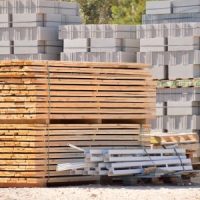Dealing With Fluctuations In The Cost Of Raw Materials

When you enter into a contract, before you sign, you are supposed to weigh the pros and cons, and consider the risks inherent in the deal. If there are risks, those risks should be addressed. You should know in advance what you stand to gain and lose under the terms of the deal. Usually, with some good research and due diligence, as well as just knowing what you’re doing, you can do that.
Fluctuating Prices
But sometimes you can’t plan ahead. That’s because some things are out of your control, even though you know they will happen. One of those things is fluctuating prices of goods and raw materials.
Think about it-how often do things like metals, cement, gas, or lumber go up or down in price (especially in today’s economy, where it seems like commodities spike and plummet routinely)?
How does either party to a construction contract bargain intelligently and mitigate their risks, when tomorrow the price of a material good could go up or down? A great contract today can be a huge money loser tomorrow based on a market fluctuation. This is especially true with larger, longer jobs, which, over time, may lead to the price of raw materials varying wildly.
The Material Escalation Clause
Enter the material escalation clause. This is a clause that accounts for the increase or decrease of raw materials. An escalation clause can work in a number of ways.
One way is simply comparing what a job actually costs, with what it was anticipated to cost when the contract was entered into. The parties can have a contractual formula that increases the owner’s price, based on a percentage of the increase of raw materials for the builder.
Likewise, to appease owners, the owner can get a benefit-a reduction in cost on a percentage basis—should the price of raw materials plummet, thus making the job cheaper for the construction company to complete.
The percentage extra (or savings) can be absolute, such as saying that the owner will pay X% of any cost increase over a given dollar figure. Or, there can be a threshold. For example, saying that the owner will pay X% of any increase in the cost of raw materials, if the cost goes beyond a given dollar figure or price point.
Total Reimbursement
Another way to use an escalation clause is simply complete reimbursement. The builder will get paid extra, to account for all of the increase in raw materials. There is no percentage, or formula, or threshold. Likewise, the owner will get a price reduction, for any savings caused by a drop on the cost or value of raw materials.
Bear in mind that escalation clauses usually deal with volatile changes in the price or cost of goods. Not costs associated with hurricanes, civil unrest, pandemics, or other factors, which would fall under the Force Majeure clause of a construction contract.
Be prepared for any contingency. Call our Fort Lauderdale construction attorneys at Sweeney Law P.A. at 954 440-3993 for help today.

